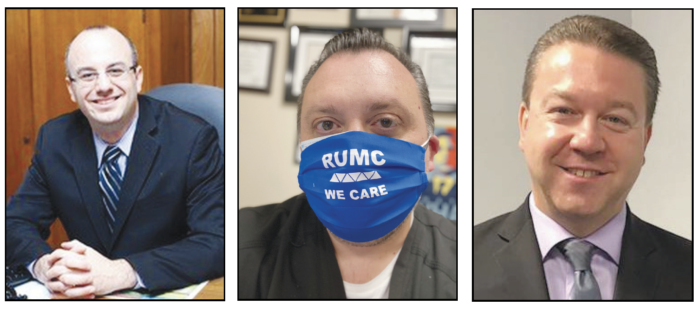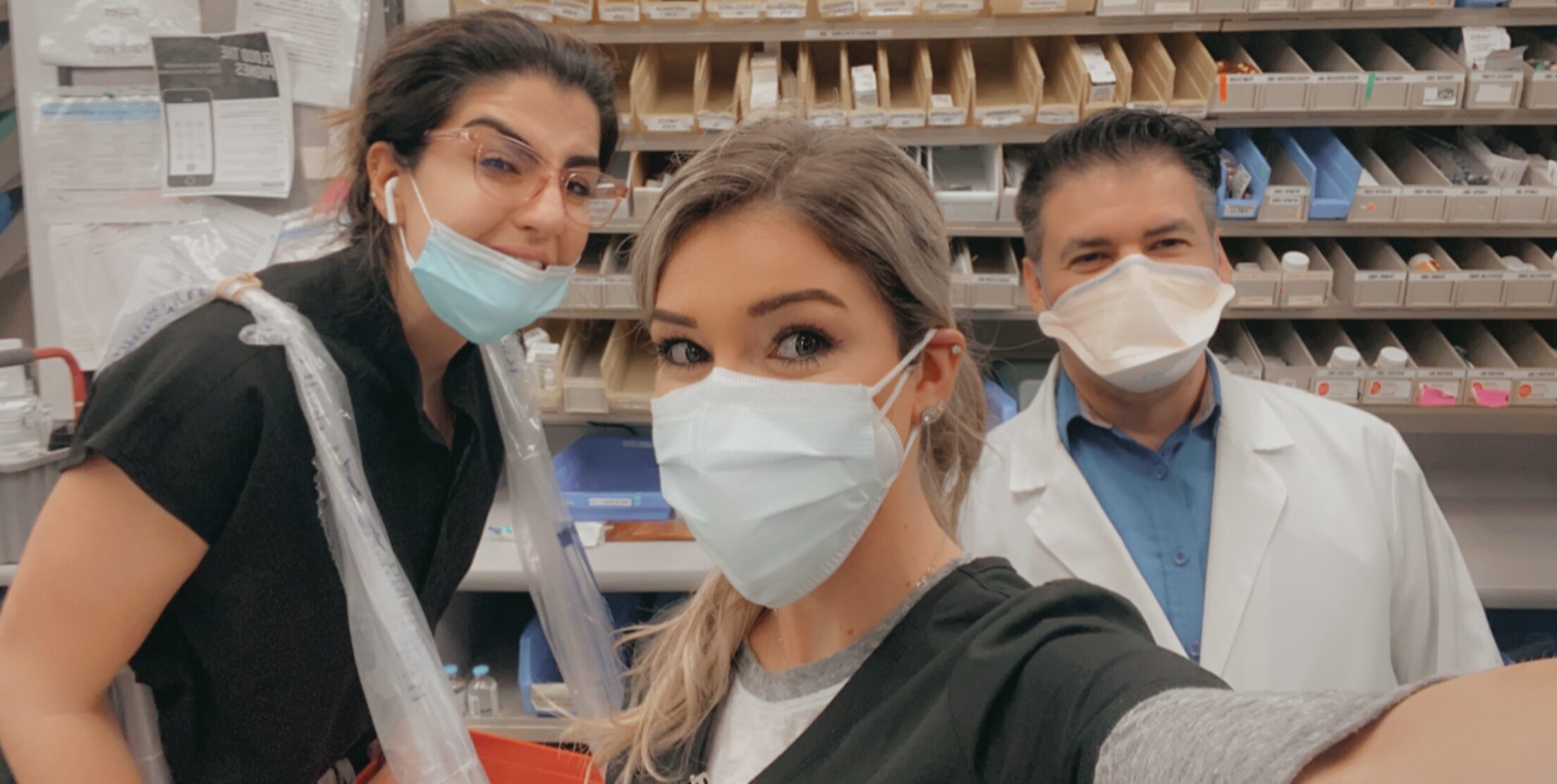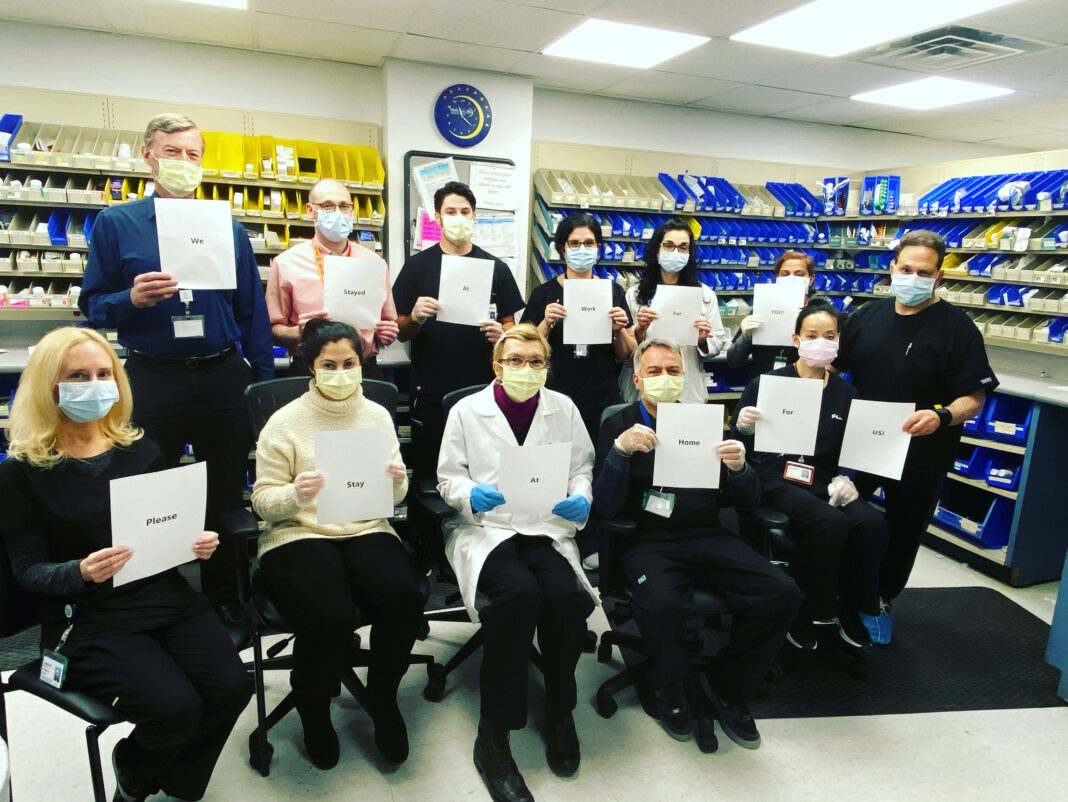Richmond University Medical Center (RUMC) in Staten Island is one of the hospitals at the epicenter of the Coronavirus pandemic. Hellenic News of America’s publisher, Aphrodite Kotrotsios spoke with Dr. Philip Otterbeck: Chairman, Department of Medicine and Dr. Lenny Shats: Manager and Clinical Coordinator, Department of Pharmacy at RUMC on their encounter with the virus. Alex Lutz, Director of PR and Marketing mentioned during the interview that the numbers have gone down in terms of the inpatient population. As of May 17th, 1,024 COVID-19 patients have been treated and discharged through the care provided by their heroic physicians, nurses, pharmacists, and staff. Aphrodite’s youngest sister, Dr. Ioanna Kotrotsios is a pharmacist at RUMC.
Aphrodite Kotrotsios: How do things compare from the beginning of the outbreak to the peak to up until now?
Dr. Otterbeck: In terms of volume, the overall numbers relative to previous times are down. However, the acuity of the patients (sickness) is up. Meaning, patients that are coming to the emergency department have a higher chance of getting admitted for their medical conditions. Furthermore, the number of patients requiring advanced care, for example, a ventilator, is much higher. While the overall number is down, the sickness of the patient is much higher than it previously has been.
We have been seeing the number of patients on ventilators coming down, and the number of discharged patients going up simultaneously, so we are very happy to see that trend. That coincides with the concept that is at or past the peak in the COVID outbreak in New York, specifically in Staten Island.

The morale of the staff has been tremendous throughout this event, people are working long hours and very hard to try to do our best for all of our patients and the fruits of that labor is in the number of patients that have improved and survived to discharge.
Aphrodite Kotrotsios: What was it like for you at the beginning of the outbreak? What helped you stay strong and united for your community?
Dr. Shats: I think with any organization you look to your leadership for support and guidance. We got that tremendous opportunity to see our administrators act quickly and guide us through the beginning stages of the pandemic and it helped a lot to help guide my staff in the right direction to let them know what is going on and what we want them to do on a daily basis. Now that the numbers are improving, my staff is way more confident in knowing that whatever we do on a daily basis is helping people and they want to be a part of this team and they do not want to stop until we discharge our last COVID patient.
Aphrodite Kotrotsios: What do you believe has helped decrease the number of cases coming into the hospital? [Have the number of cases decreased? If so, what do you believe has helped?]
Dr. Otterbeck: I think that the strong efforts from our leaders of the state, federal, and local level to encourage people to stay home and information for self-isolation if someone comes down with the condition, helped mitigate and decrease the number of cases that are spreading throughout the population.
Aphrodite Kotrotsios: COVID-19 is an emerging, rapidly evolving situation, what measures has the hospital implemented to adjust to the COVID-19 outbreak for its staff and patients.
Dr. Otterbeck: In accordance with the requirements of the government, we have increased by more than 50% of our capacity to take in patients. We normally have 26 ICU beds, and we actually exceeded the requirement and were able to submit a plan to have over 71 beds. We were able to achieve that through expansion and utilizing staff members and re-assigning them to this kind of work to make sure we had adequate staff to take care of these patients with COVID diagnosis.
Aphrodite Kotrotsios: What makes this particular coronavirus strain significantly concerning?
Dr. Otterbeck: The fact that we don’t have immunity to this virus, and we have never seen this virus before so we have no natural immunity. That coupled with the fact that we have no vaccine, or evidence-based treatments options available to us. Lenny can tell you that we have been using hydroxychloroquine and azithromycin for many patients. Secondly, it is very easily transmitted from person to person. So the degree of virulence there that the virus’s properties have allowed it to enter our bodies very effectively and while that’s good for the virus that’s bad for the patients. Many patients have unfortunately succumbed to the virus and ended up on ventilators because of the deterioration in lung function. However, those kinds of severe cases only make up about 5%, whereas most cases (85%) are mild-moderate and those people don’t actually need to come to the hospital and they can be managed outpatient.
Dr. Shats: Because it is such an elusive virus and there was very little information we knew about the treatment plan. Just like Governor Cuomo stated how we have been acting “behind” this virus and we are always trying to “catch up” to it and it’s always a step ahead of us. Now we are gaining more confidence as we learn more and more every day. I think that it feels like we are getting a better grasp on it from the information we are getting from Washington D.C. and other countries that have greatly helped.

Aphrodite Kotrotsios: How can we overcome the challenges we are facing from this pandemic?
Dr. Shats: Continue to follow the guidance given to us by our government, state, and federal leaders to stay at home and save lives. We are used to battling for patient’s lives here in the hospital, but what makes it even more challenging is that we now have to come home and battle it for our families. For example, some of us have to live in the garage or basements and not see our families and send our children away to avoid us. And we need the same exact support from our community so that we can continue to do what we do on a daily basis. Up to now, it has proven to be successful in many ways, and if we continue to do that we will finally beat that.
Aphrodite Kotrotsios: What kind of support have you received from the SI community? Are you still looking for donations of PPE? Tell me about masks and protective gear, has the situation come under control?
Dr. Otterbeck: The Staten Island community has been really wonderful. Every day that goes by, the hospital has been inundated with food from restaurants that have been purchased and donated by individuals and businesses to feed our staff, which is really incredible. As you know, in the beginning of the pandemic there was a shortage of PPE. People have really rallied, including private citizens and doctor’s offices to donate PPE to us and dropping it off at the hospital for the staff. It was incredible to see the focus on the community rallying and giving the hospital and healthcare workers the support that they have given us.
Alex Lutz: Very similar to what you saw after 9/11, the outpouring of support to firefighters, we are seeing the same thing here, as are many hospitals around the city. From supplying our staff with food and PPE, it has been incredible. Of course any donations of PPE we receive we put them through our infection control department before we have our staff utilizing them to make sure that they are safe. But it is also the things that you don’t see. We have a local artist that erected this huge “thank you” sign across the main entrance from our hospital. We had a local staff member who is also a DJ in his spare time who gave a concert outside the hospital, providing uplifting and inspirational music to the patients and staff on hand. We also had a Greek restaurateur who succumbed to COVID-19 in our hospital, but his family set up a GoFundMe page for our hospital. I just want to say how tremendously appreciative we are of thinking about our hospital, and our thoughts and prayers go out to his family. I just wanted to say that their efforts to support our hospital are not going unnoticed, and it is a continuous outpour. We’ve had firefighters, police officers and people passing our hospital sounding their horns/sirens, or applauding our staff. Many of the COVID-19 patients that we have treated and discharged have said that when this is all over, they want to come back and volunteer at our hospital to help give back and be a part of the hospital that helped save their lives.
Dr. Shats: Even outside of the hospital, I had a personal experience walking into Costco wearing my employee badge and scrubs, and one of the employees came up to me and say “Thank you. Thank you for everything you and your colleagues are doing”. It fuels your energy to continue to go on and do what we do on a daily basis. And Dr. Otterbeck and our nursing team have been doing a tremendous job. The support we get from our community has helped us so much along the way.
Aphrodite Kotrotsios: Pharmacists play an important role in the interdisciplinary approach to patient care. What are some of the examples of your team’s daily input in combating COVID-19 at RUMC?
Dr. Shats: Our biggest input and challenge has been to make sure that our hospital is supplied with medications that are needed for not only COVID positive patients but also all patients admitted to the hospital. With all of the drug shortages and backorders, we make sure we not only provide plan a to our medical and nursing staff, but also plan B and C because at any given time we could run out of medications for a patient and go to our plan b. There is no time to waste and we cannot start to look for alternatives, and these have to be in place before they happen, so we have to be very proactive. Our technicians have addressed the need to bring medications to the floors as quickly as possible. My clinical pharmacy team has been working very hard on various protocols that are now required to treat patients, and we have been very lucky to be part of the team here at RUMC. We are looking forward to discharging more patients every day.
Aphrodite Kotrotsios: Are people afraid to come into the hospital? Have you seen a decrease in cancer patients or heart attacks, etc? What would your message be to people to feel comfortable and safe coming into the hospital?
Dr. Otterbeck: We have seen a decrease in admissions in typical medical problems. Part of that may be that people are a little bit reluctant to come in due to Coronavirus in the community, part of that is that they are trying to avoid coming in because they prefer to stay home in the context of all of this. But, the community needs to be aware that we are open for business in the sense that anything that needs emergency care can be handled in the emergency department and it can be handled safely. If you are having chest pain, or a foot ulcer, or a case that requires a visit to the emergency department, we are there and able to provide all the services that we always have.
Alex Lutz: When we started to prepare for a patient surge in COVID-19, our physicians and administration realized early on that the high-risk individuals be kept out of the hospital as much as possible. So we have an off-site center for cancer care. So we moved all of our cancer operations out of our hospital to the cancer center. This was done to so that our cancer patients could be safer at the cancer center where they could continue their chemotherapy/radiation or whatever treatment they are receiving, so we are not delaying their recovering and treatment out of fear because that would have been detrimental to them, but we also wanted to limit their potential exposure to COVID-19.
Aphrodite Kotrotsios: What can we do from our homes to stay healthy, and what is your message to the community?
Dr. Otterbeck: Lenny indicated earlier that we should be listening to our health and government officials to stay home. We should continue to stay home until it is determined that the virus is at a certain level that it is safe for people to go out and about their daily routine. Also, if you are developing symptoms that could be consistent with COVID-19, it is important to discuss it with your primary care physician. Many physicians, including us, have been doing TeleMedicine/TeleHealth visits, to communicate with patients. So if patients are having symptoms, based on those symptoms, the doctor would advise them whether or not they should be isolating themselves from the community and their own family members.
Dr. Shats: We have been very patient, and it has definitely taken a toll on us. But, we are all in this together. We just need to remember that “every storm runs out of rain”. So we need to be patient and follow guidelines, and eventually, this will end. Eventually, we can go back to our new normal.
Aphrodite Kotrotsios: Is there anything else that you would like to add?
Alex: Getting back to donations, I just wanted to say how helpful our elected officials here in SI have been. We have received PPE, ventilators, and everything we have needed come to our hospital through the mayor’s office, governor’s office, NYC Department of Health and Mental Hygiene, New York State Department of Health, and elected officials in Staten Island. They have forgotten any kind of political affiliations and they are all working together for our hospital and all NY hospitals. And if not all, most of our requests for the things that we need, we have received from all of these entities. What’s unique about RUMC is that we are not part of a larger health system like Northwell or Presbyterian, we are a stand-alone hospital. So we do not have a larger warehouse or chain that we can run to for PPE or ventilators, as other larger hospitals may have. But, that has not hindered our elected officials and the city agencies from giving us the same level of attention as the larger systems, and we just wanted to express our gratitude to all of them.
Aphrodite Kotrotsios: Thank you Alex, Dr. Otterbeck, and Dr. Shats, I really appreciate your time and efforts. I am truly amazed by the amazing and coordinated effort from our healthcare professionals and our frontline workers.
Alex & Dr. Otterbeck: You too, stay safe and healthy.
Dr. Shats: “Eυχαριστώ στην Eλληνοαμερικανική κοινότητα για την υποστήριξή τους”. {Thank you to the Greek-American community for their support}.








